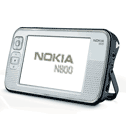Internet tablet - What's the point?

I have been recently introduced to Nokia's Internet Tablet devices. The latest member of the family, Nokia N800, is a palm-sized device with a generous touch-screen. It comes with a traditional stylus and is Bluetooth and Wi-fi (802.11 b/g) enabled. The underlying operating system is called Internet Tablet OS 2007 which is derived from Linux Debian. The presentation stack - dubbed Maemo - uses a higher layer of abstraction called Hildon.
The N800 really caught my attention the first time I had it in my hands even though I found amazingly strange that it does not have a 3G-compatible phone embedded in it. Although the device is highly portable and greatly flexible, it can not be used to make phone calls using the traditional cell network. Why would Nokia make a device that is not a phone? What is the main point behind it?
The main sale point of the device is not the same as a traditional PDA concept (Personal Digital Assistant - powerful agendas) or the Smartphone idea (powerful mobile phones) or the iPhone concept (a powerful MP3 player that makes phone calls). It is clear that Nokia is trying to create a new kind of portable device here. It might even be as clear as it is stressed on the product family name: "Internet Tablet".
Nokia is creating a small internet surfing device targeted to people that have Wi-fi networks within reach, have a limited use of internet (e-mail, surfing, Skype, etc) and are willing to carry a small device around (and pay a couple of hundred Euros in the way). This might be the birth of a separate family of products. A family of products that are not PDAs, nor Smartphones and nor powerful iPods. They are simply Internet Tablets.
But will the idea become a success? Is it a profitable concept? We have seen the Palm PDA fever then the PocketPC one and now big players are fighting over Smartphones (PocketPC versus Symbian) and Apple is creating their own parallel universe with super iPods that eventually work as telephones.
I have a feeling that Nokia is making the right move mainly when deciding to use Linux-based OS. Open-sourced OSs running on mobile devices might change definitely the way we use mobile computing.
It is worth paying attention to were the market will lead us.